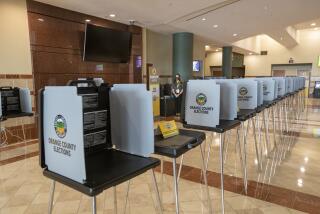Confusion on Money-Market Rules
- Share via
QUESTION: I was told recently that there isn’t any longer a rule requiring savers to deposit at least $2,500 when they open a money-market account at a bank. But when I went to my bank to open one last week, I was told I was mistaken and that I still have to have at least $2,500 to open such an account. Who’s right?--C. E.
ANSWER: The truth lies somewhere in between. As part of its push to deregulate the U.S. financial industry, the federal government first cut the minimum balance requirements on such accounts to $1,000 from $2,500 and then dropped them entirely Jan. 1.
All that means is there is no longer any federal minimum deposit requirement. The financial institutions may continue to impose their own--and most have. The institutions have been slow to respond to the relaxed rules because it costs them money. Many, in fact, haven’t yet strayed from the $2,500 requirement even though it was cut to $1,000 more than a year ago.
So, as long as they can continue to drum up business for these accounts, even with a big minimum balance requirement, you can be sure they will continue to demand it. Only competition will force the change.
Q: Why do so many financial advisers tout U.S. Treasury bills as a good investment for people who view investments primarily as a way to cut their taxes?--V. B. W.
A: Besides having the financial muscle of the federal government backing them, Treasury bills are a good tax-saving investment because they are exempt from state and local income taxes. Thus, they are particularly good investments for taxpayers who live in states with high local and state income tax rates.
The Research Institute of America, a tax research group, calculates the savings this way: A taxpayer whose top state income tax rate is 8% would get the same effective after-tax yield from a fully taxable investment yielding 8.7% or from a Treasury bill yielding 8%. Not a huge difference but significant over a period of several years.
Watch, though, what happens as the top state income tax rate climbs. At a top state rate of 10%, that same Treasury bill, yielding 8%, would pay the owner the same amount after taxes as a fully taxable investment yielding 8.9%. At 12%, it would take a fully taxable investment of 9.1%. At 14%, the fully taxable equivalent would be 9.3%. And at 18%, a 9.8% fully taxable investment would be required to get the same effective after-tax yield of an 8% Treasury bill.
In California, the top state income tax rate is 11%. Taxpayers taxed at that rate would earn just as much after taxes from a Treasury bill yielding 8% as they would from a fully taxable investment yielding 9%.
Q: Does the government set limits on how much someone can contribute to a candidate for political office?--B. H.
A: No individual is permitted to give a candidate for federal office any more than $1,000. If you want to contribute more than that, legally, you can make your contributions to one or more political action committees, which will dole out the money to candidates of their choice. If you choose the latter, the limit is $5,000 per political action committee, up to a maximum of $25,000.
Limits on contributions to candidates for state office vary from state to state. In California, there are no state limits.
If a Californian’s annual contributions to state and local candidates exceed $10,000, however, he or she must file an accounting of the contributions with a state or local agency. If your contributions are to statewide candidates or to candidates in more than one county, you must give the secretary of state’s office a rundown of your contributions. If you limit your political gifts to candidates in a single California county, you must file with that county’s registrar’s office.
Some local governments have their own rules, however. So, if in doubt, check with your county registrar’s office.
Debra Whitefield cannot answer mail individually but will respond in this column to financial questions of general interest. Do not telephone. Write to Money Talk, Business Section, The Times, Times Mirror Square, Los Angeles 90053.
More to Read
Inside the business of entertainment
The Wide Shot brings you news, analysis and insights on everything from streaming wars to production — and what it all means for the future.
You may occasionally receive promotional content from the Los Angeles Times.










